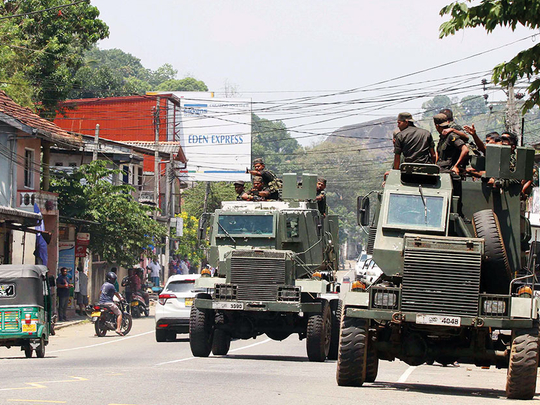
Kandy (Sri Lanka): Buddhist mobs are still sweeping through Muslim neighbourhoods in Sri Lanka’s central hills, destroying stores and restaurants despite a curfew, a state of emergency and heavy deployment of security forces, residents said Thursday.
About 50 people broke into Mohammad Ramzeen’s small restaurant in the town of Pilimathalawa on Wednesday night while the curfew was in effect, destroying nearly everything they found.
“The security in town is inadequate,” Ramzeen said. “We fear for our lives.”
Others in the area around Kandy, the main hill town, have described similar attacks since the violence began early this week. The streets of most towns were all-out empty Thursday except for police and soldiers.
The government ordered a state of emergency on Tuesday, and has shut down a handful of popular social media networks, saying they were being used to spread false rumours that led to mob attacks.
“Technology created to bring people together, is being used to pull people apart,” technology minister Harin Fernando was quoted as saying by the Sri Lanka Mirror. “Social media websites such as Facebook, WhatsApp and Viber — which were created to bring us closer to our friends and family and make communication free and convenient, have been used to destroy families, lives and private property.”
A daytime curfew was meanwhile relaxed on Thursday in the troubled Sri Lankan district of Kandy, but schools remained closed as beefed-up security forces patrolled the streets.
More than 200 homes, businesses and vehicles were set ablaze during three days of violence sparked by the death of a man from the mainly Buddhist Sinhalese majority at the hands of a Muslim mob last week.
The unrest began in the central district on Monday, and escalated the following day when a Muslim man was found dead in a burnt building.
A 24-hour curfew was imposed on Wednesday afternoon after a hand grenade exploded in the hands of an attacker, killing him and wounding 11 others, officials said.
But following a calm night, authorities decided to ease the curfew six hours earlier than planned, police spokesman Ruwan Gunasekera said.
President Maithripala Sirisena on Wednesday toured Kandy, where rioters had defied curfews and clashed with police who used tear gas to disperse them.
“I have ordered that the full force of the law be used against troublemakers,” he said.
Military officials said more reinforcements were sent to the area on Wednesday night to assist police.
The United Nations has condemned the violence and urged Colombo “to ensure that appropriate measures are swiftly taken to restore normality in affected areas”.
Sri Lanka has long faced a bitter ethnic divide between the majority Sinhalese and the minority Tamils, fuelling a bloody, decades-long civil war as Tamil militants tried to carve out their own homeland. But in the years since the war ended in 2009, a religious divide has grown, with the rise of hardline Buddhist groups that stoke anger against minority Muslims. Sinhalese are overwhelmingly Buddhists, while Tamils are Hindu, Muslim and Christian. The violence and the heavy security presence are largely contained to the island’s central hills. In the capital, Colombo, and other cities and towns, there are few if any signs of trouble.
Parliament on Tuesday issued an apology to the Muslim minority for the latest violence targeting them in the Indian Ocean island.
Mobs also set fire to Muslim-owned businesses and attacked a mosque in the east of the country last week.
Last November riots in the south of the island left one man dead and homes and vehicles damaged. In June 2014 riots between Buddhists and Muslims left four dead.
Sri Lanka at a glance
What’s happening in Sri Lanka?
• Holidaymakers have been urged to avoid the hill resort but no foreigners have been reported involved in the unrest.
• The government has responded to the riots by ordering a nationwide state of emergency, giving security forces and police special powers to arrest and detain suspects.
• Internet access has been restricted in Kandy and social media websites blocked in a bid to prevent the spread of anti-Muslim hate speech.
• Tensions between Muslim groups and the majority Sinhalese Buddhist community in the country have escalated since the end of the civil war in May 2009.
• In 2014, violence directed against Muslim minority groups broke out in the southwestern town of Aluthgama, following a rally by hardline Buddhist nationalist monks, resulting in the death of at least three Muslims.
• The violence and the heavy security presence are largely contained to the island's central hills.












